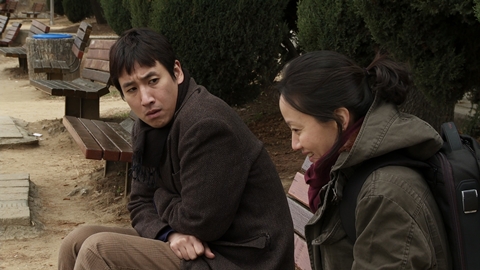 OKI'S MOVIE Well, that’s the question, really: whose movie is it? OKI'S MOVIE Well, that’s the question, really: whose movie is it? |
"Your sincerity needs its own form," a film professor advises a student in prolific Korean director Hong Sangsoo's most recent work,
OKI'S MOVIE. "Form will take you to the truth. Telling it like it is won't get you there." Ironic context aside - which is almost never the case with this most sardonic of filmmakers - these principles lie at the heart of Hong's films, which are being shown in a must-see retrospective at the Harvard Film Archive. The sincerity of the material - disillusionment, dissolution, deluded love - is inescapable. But the form - arbitrary, ingenious, diabolical - is what prevails.
Whether the form does takes you to the truth, however, is open to interpretation. In Oki's Movie (2010; February 5 @ 7 pm, with the director present), the filmmaker's identity itself is in question. Ostensibly four interrelated films, it opens with "A Day for Chanting," in which goofy filmmaker, professor, and wayward spouse Jingu provides voiceover narration as Hong's cinematic grammar of long takes punctuated with the occasional pan, tilt, and zoom records the wry banality of his life. As unwise in academic politics as he is in love, Jingu drunkenly confronts his department head, Professor Song, with rumors of malfeasance and in the end hilariously endures similar scrutiny at a Q&A following a screening of one of his films.
In fact, "A Day for Chanting" is a film made by Jingu. Or so it appears in the second episode, "King of Kiss," in which Jingu is a student, Song is his professor, and Oki, the third part of their romantic triangle, makes her appearance. Who's behind "King of Kiss" is unclear, but the third episode, "After the Snow Storm," seems the work of Professor Song, and the fourth, "Oki's Movie," is by the elusive woman both Song and Jingu are self-destructively pursuing.
Sounds confusing, but it's business as usual for Hong, a variation of form and content that he's worked with at least since his second film. THE POWER OF KANGWON PROVINCE (1998; January 28 @ 7 pm) takes a kind of Kieslowskian approach with its twice-told tale, as two ex-lovers go on separate vacations in the same place and at the same time, but in separate episodes in which neither is aware of the other's presence and their stories never quite connect. Similarly, the grimmer VIRGIN STRIPPED BARE BY HER BACHELORS (2000; February 4 @ 7 pm) - which poses another love triangle involving filmmaking colleagues and their mutual, obscure object of desire - requires two versions, separated by a central, literal moment of suspense.
Hong can play it straight, too - sort of. As befits its Truffaut-ish title and Paris location, NIGHT AND DAY (2008; February 7 @ 7 pm) embraces the puckish sensibility of the early New Wave. Told with the nuanced simplicity of a Rohmer Moral Tale, as well as the deadpan absurdity of minimalists like Aki Kaurismäki, it follows the misadventures of a hapless young Korean painter adrift in a drab part of town. He is inexplicably drawn, like every Hong hero, to a woman he knows nothing about. Here, as in each of his films, Hong obsessively circles a handful of intractable truths, not unlike Jingu in Oki's Movie as he feverishly sketches a tiny milk carton he's found on a park bench. "I would know everything," Jingu demands of the sad, irrefutable object, "if I knew why you were there."